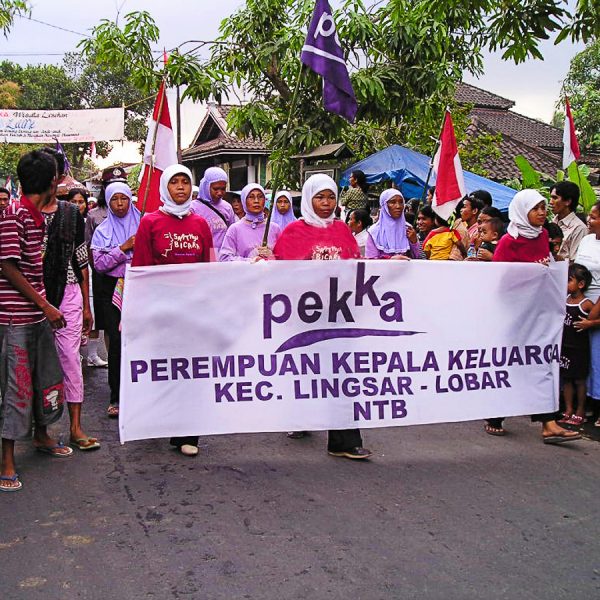Nani Zulminarni, Founder of PEKKA
Jakarta, Indonesia
Sector: Women’s rights, Equity, Civic Engagement
Scaling type: Scaling deep, scaling up, scaling out
Ashoka Fellow since 2007

Nani Zulminarni has long been driven by a profound concern for the injustices, inequalities, and invisibility faced by women-headed households in Indonesia. Her own journey laid bare these issues when, after her divorce in 2000, she encountered the harsh reality that a woman’s legal standing was bound to her marital status. The societal, economic, and legal stigmas of being a single woman weighed heavily on her, yet she knew her struggle was shared by many. As she said, “I am not alone in this; we are millions.”
Through her lived experience, Nani began to understand the deeper layers of oppression that shaped the status quo for women-headed households in Indonesia. She identified two forms of power perpetuating these conditions: “visible power” and “invisible power.” Visible power manifested through laws that enshrined men as the heads of families, granting them authority over women. These legal frameworks reinforced the subjugation of women. Meanwhile, invisible power lay in the informal societal structures, where religious interpretations and cultural perceptions shaped the ways women viewed themselves. This hidden power not only perpetuated their marginalization but also obstructed their ability to recognize themselves as leaders and agents of change.
In response, Nani founded Women-Headed Families organization (PEKKA) to challenge and ultimately dismantle this restrictive status quo. Statistics reveal that one in four families in Indonesia is led by a woman, whether due to widowhood, divorce, abandonment, or polygamous marriage. These women often share the painful experience of being stigmatized and marginalized. Nani envisioned a society where women leading households would no longer be sidelined, but recognized as the heads of their families with dignity and power. The values of justice, equality, and visibility became the cornerstones of her mission. To achieve this, she crafted a visionary, multi-layered strategy built around three pillars: scaling deep, scaling up, and scaling out.

Nani sought to transform the very foundation of power dynamics within families and society by fostering a shift in how women saw themselves. This meant more than just advocating for new laws; it required a deep transformation of women’s self-perception. By organizing women into a collective, Nani spearheaded a movement where their stories became tools of change. Through a massive community-driven data collection initiative, she empowered women to document their own experiences, hiring and training young women to gather vital information on the realities of women-headed households. With over 70,000 women organized, PEKKA became a force for change, compelling the government to confront the reality of women’s lives. Nani recognized that when women shared their struggles and triumphs, they could unearth the invisible forces governing their lives and begin to reshape them.
Nani’s vision extended far beyond individual households. The ripple effect of PEKKA’s work reached millions: 70,000 women mobilized as agents of change, 19 million women gaining legal visibility, and 40 million children finally recognized with birth certificates. The combined efforts of scaling deep, changing the social fabric from within, and scaling up, addressing the legal framework, culminated in scaling out—a transformation that touched lives across Indonesia.
Through PEKKA, Nani Zulminarni achieved what the WISE theory of change outlines as the powerful interplay of scaling deep, up, and out. Her work has forever altered the lives of countless women and children, ensuring that the fight for justice, equality, and visibility will continue for generations to come.
With the momentum built from grassroots organizing, PEKKA turned its attention to legislative reforms. The Marriage Law of 1974 had long contributed to the invisibility of women, with approximately 60% of marriages going unregistered. This lack of formal recognition denied women their legal rights, leaving them and their children in limbo. Through tireless advocacy, Nani and her team addressed the barriers that kept marriages from being registered—high court fees, lack of accessible information, and distant registration centers. PEKKA pushed for the introduction of mobile courts to bring legal services directly to remote villages and successfully campaigned for a waiver of registration fees for low-income families.
PEKKA’s work also illuminated a devastating truth: 40 million children were without birth certificates simply because their mothers lacked legal identity. As a result of Nani’s relentless efforts, the government created a “one-stop service system,” enabling women to register marriages, divorces, and secure birth certificates for their children in one streamlined process.
By June 2020, PEKKA’s advocacy led to a watershed moment: the official recognition of women-headed families in government policies. The Ministry of Village Affairs implemented changes that granted legal recognition and financial support to 19 million women heads of households. Moreover, for the first time, women were allowed to attend village meetings, previously dominated by male elites. This newfound visibility and inclusion marked a significant social status shift.
In the WISE theory of change, the three angles of the triangle: scaling up, scaling deep, and scaling out, are achieved in PEKKA, which means that Nani Zulminarni changed the lives of Indonesian women and children for generations to come.